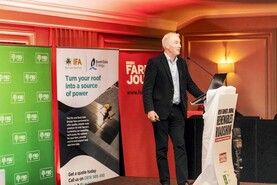DEAR SIR: In response to last week’s Irish Farmers Journal front page, I wish to state that no proposals on the suckler herd have been agreed as of yet at the Food Vision beef group.
The Food Vision group has proposed nothing yet. What was quoted on the front page is ideas for discussion put forward by the Department, who are pushing hard to get quick conclusions because Government has decreed the agriculture sector must cut emissions by 25% by 2030.
Like it or not, the Climate Plan targets are not going away, and regardless of what farm organisations do, no political party voted against the Climate Bill.
Nonetheless, this doesn’t mean farm organisations are taking a compliant view, and agreement won’t happen without consultation with farmers.
At group meetings, I outlined that the Climate Action Plan envisages a total investment requirement to reach the 51% target for Ireland of €125bn, of which €48bn is new money.
If agriculture is blamed for 37% of emissions, then we need the Government to deliver a substantial part of this €48bn to the farming sector if they are serious, because barely viable cattle and sheep farms cannot fund this.
Regarding bull beef, ICSA challenged the meat processors to deliver more bull beef markets while also outlining that with meal at €450+/ t, earlier finishing is a big challenge.
A possible reduction in suckler cow numbers was rebuffed by all, including meat processors. A similar discussion has been ongoing in the dairy sector; always based on voluntary actions.
The real objective, in my view, must be that there is space for any farmer, especially young farmers, to have freedom to farm and expand in the future.
Complex issue
This is a complex issue, and we must be mindful of the importance of sucklers in many communities and in efficient beef finishing systems. ICSA is also calling out the poor beef merit in dairying and the need for genotyping for dairy bull calves.
There has also been robust debate around emerging Teagasc research that we are likely overestimating emissions from grass-fed cattle, but this will not be accepted without peer review.
There’s lots for farmers to be angry about, including unfair coverage in the national media, and the inconsistencies around GHG accounting protocols such as farmers not getting credit for tree planting, renewable energy and the fact that our carbon sinks are not measured.
Not to mention the critical issue around methane, carbon cycles and a stable herd.
All these points are being made forcibly to Government. However, the last thing we need is complete division and turning on ourselves when the battle is with external players.
Above all, we need to focus on persuading the wider population our produce is sustainable and that food and energy security must not be sacrificed to make marginal gains on climate.






 This is a subscriber-only article
This is a subscriber-only article











SHARING OPTIONS: